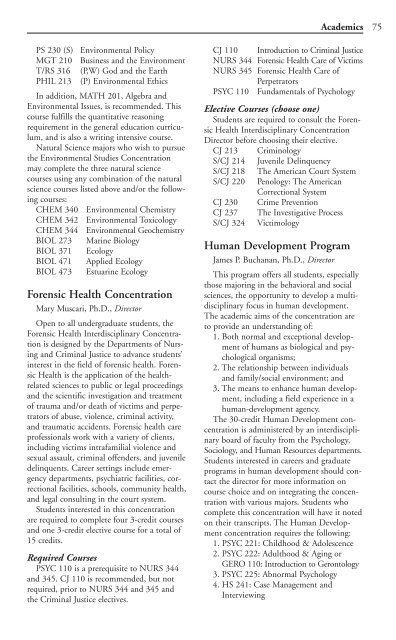2003-2004 - The University of Scranton
2003-2004 - The University of Scranton
2003-2004 - The University of Scranton
Create successful ePaper yourself
Turn your PDF publications into a flip-book with our unique Google optimized e-Paper software.
PS 230 (S) Environmental Policy<br />
MGT 210 Business and the Environment<br />
T/RS 316 (P,W) God and the Earth<br />
PHIL 213 (P) Environmental Ethics<br />
In addition, MATH 201, Algebra and<br />
Environmental Issues, is recommended. This<br />
course fulfills the quantitative reasoning<br />
requirement in the general education curriculum,<br />
and is also a writing intensive course.<br />
Natural Science majors who wish to pursue<br />
the Environmental Studies Concentration<br />
may complete the three natural science<br />
courses using any combination <strong>of</strong> the natural<br />
science courses listed above and/or the following<br />
courses:<br />
CHEM 340 Environmental Chemistry<br />
CHEM 342 Environmental Toxicology<br />
CHEM 344 Environmental Geochemistry<br />
BIOL 273 Marine Biology<br />
BIOL 371 Ecology<br />
BIOL 471 Applied Ecology<br />
BIOL 473 Estuarine Ecology<br />
Forensic Health Concentration<br />
Mary Muscari, Ph.D., Director<br />
Open to all undergraduate students, the<br />
Forensic Health Interdisciplinary Concentration<br />
is designed by the Departments <strong>of</strong> Nursing<br />
and Criminal Justice to advance students’<br />
interest in the field <strong>of</strong> forensic health. Forensic<br />
Health is the application <strong>of</strong> the healthrelated<br />
sciences to public or legal proceedings<br />
and the scientific investigation and treatment<br />
<strong>of</strong> trauma and/or death <strong>of</strong> victims and perpetrators<br />
<strong>of</strong> abuse, violence, criminal activity,<br />
and traumatic accidents. Forensic health care<br />
pr<strong>of</strong>essionals work with a variety <strong>of</strong> clients,<br />
including victims intrafamilial violence and<br />
sexual assault, criminal <strong>of</strong>fenders, and juvenile<br />
delinquents. Career settings include emergency<br />
departments, psychiatric facilities, correctional<br />
facilities, schools, community health,<br />
and legal consulting in the court system.<br />
Students interested in this concentration<br />
are required to complete four 3-credit courses<br />
and one 3-credit elective course for a total <strong>of</strong><br />
15 credits.<br />
Required Courses<br />
PSYC 110 is a prerequisite to NURS 344<br />
and 345. CJ 110 is recommended, but not<br />
required, prior to NURS 344 and 345 and<br />
the Criminal Justice electives.<br />
Academics 75<br />
CJ 110 Introduction to Criminal Justice<br />
NURS 344 Forensic Health Care <strong>of</strong> Victims<br />
NURS 345 Forensic Health Care <strong>of</strong><br />
Perpetrators<br />
PSYC 110 Fundamentals <strong>of</strong> Psychology<br />
Elective Courses (choose one)<br />
Students are required to consult the Forensic<br />
Health Interdisciplinary Concentration<br />
Director before choosing their elective.<br />
CJ 213 Criminology<br />
S/CJ 214 Juvenile Delinquency<br />
S/CJ 218 <strong>The</strong> American Court System<br />
S/CJ 220 Penology: <strong>The</strong> American<br />
Correctional System<br />
CJ 230 Crime Prevention<br />
CJ 237 <strong>The</strong> Investigative Process<br />
S/CJ 324 Victimology<br />
Human Development Program<br />
James P. Buchanan, Ph.D., Director<br />
This program <strong>of</strong>fers all students, especially<br />
those majoring in the behavioral and social<br />
sciences, the opportunity to develop a multidisciplinary<br />
focus in human development.<br />
<strong>The</strong> academic aims <strong>of</strong> the concentration are<br />
to provide an understanding <strong>of</strong>:<br />
1. Both normal and exceptional development<br />
<strong>of</strong> humans as biological and psychological<br />
organisms;<br />
2. <strong>The</strong> relationship between individuals<br />
and family/social environment; and<br />
3. <strong>The</strong> means to enhance human development,<br />
including a field experience in a<br />
human-development agency.<br />
<strong>The</strong> 30-credit Human Development concentration<br />
is administered by an interdisciplinary<br />
board <strong>of</strong> faculty from the Psychology,<br />
Sociology, and Human Resources departments.<br />
Students interested in careers and graduate<br />
programs in human development should contact<br />
the director for more information on<br />
course choice and on integrating the concentration<br />
with various majors. Students who<br />
complete this concentration will have it noted<br />
on their transcripts. <strong>The</strong> Human Development<br />
concentration requires the following:<br />
1. PSYC 221: Childhood & Adolescence<br />
2. PSYC 222: Adulthood & Aging or<br />
GERO 110: Introduction to Gerontology<br />
3. PSYC 225: Abnormal Psychology<br />
4. HS 241: Case Management and<br />
Interviewing
















